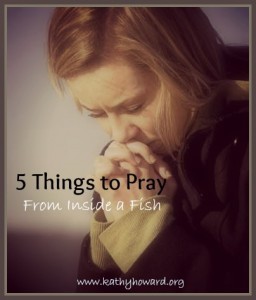Kathy Howard's Blog: Unshakeable Faith for Life, page 81
March 29, 2013
The Cross is Not Enough
Jesus’ death on the cross is not sufficient to provide the abundant and eternal life God has promised us. Does that statement shock you? The apostle Paul made it very clear to the Corinthian Christians:
And if Christ has not been raised, then your faith is useless and you are still guilty of your sins. In that case, all who have died believing in Christ are lost! And if our hope in Christ is only for this life, we are more to be pitied than anyone in the world. 1 Cor 15:17-19, NLT
Peter also knew that our eternal hope depended on the resurrection of Christ:
Praise be to the God and Father of our Lord Jesus Christ! In his great mercy he has given us new birth into a living hope through the resurrection of Jesus Christ from the dead, and into an inheritance that can never perish, spoil or fade—kept in heaven for you. 1 Peter 1:3-4, NIV
What Christ’s Death Accomplished
So why do we so often leave out the Resurrection when we share the Good News of Jesus? We don’t forget to talk about the Cross. And yes, praise God, the death of Jesus on the Cross of Calvary provided the payment that my sins – and yours – had earned. Our sins deserved the death penalty. Our sins brought us spiritual death and separation from our holy God. But Jesus Christ took that penalty on Himself. The perfect, sinless God who became man died so we could have forgiveness. But that is only part of the Gospel message.
Why We Need the Resurrection
Paul never forgot the resurrection. He knew that without it the Gospel was incomplete. In 1 Corinthians 15 Paul succinctly expresses the Good News. He boils down the message to its most important components.
For what I received I passed on to you as of first importance: that Christ died for our sins according to the Scriptures, that he was buried, that he was raised on the third day according to the Scriptures. 1 Cor 15:3-4
Yes, Jesus’ death paid the price of our sin, but His resurrection provided our hope for life – both now and eternally. Don’t miss these important truths:
Jesus’ resurrection proves that everything He said and did on earth was true. See John 14:20
Jesus’ resurrection defeated death! That victory was His and ours! See Romans 6:9
Jesus’ resurrection provides us with new life in God. See Romans 6:10, Col 3:1
Jesus’ resurrection guarantees our physical resurrection. See Rom 8:11, 1 Cor 15:20-21
Jesus’ resurrection gives us power for this life. See Philippians 3:10, Romans 8:11
Have you forgotten about the resurrection? It is the power of God for those who believe! Because Christ has been raised, we will be raised! Believers, we have the same power living in us that raised Christ from the dead! Let’s shout it out!
What is the most exciting thing to you about Jesus’ resurrection?
This post originally ran on April 2, 2012.








March 27, 2013
“Dear God, He’s Home!”
 Is your man suddenly a “stay-at-home” husband? Are you finding it difficult to adjust to the new and abundant time together? My friend Janet Thompson – who knows exactly how you feel – offers great insight and practical help in her new book “Dear God, He’s Home! A Woman’s Guide to Her Stay-at-Home Man.” Thrilled to have Janet as my guest blogger today!
Is your man suddenly a “stay-at-home” husband? Are you finding it difficult to adjust to the new and abundant time together? My friend Janet Thompson – who knows exactly how you feel – offers great insight and practical help in her new book “Dear God, He’s Home! A Woman’s Guide to Her Stay-at-Home Man.” Thrilled to have Janet as my guest blogger today!
If you have a stay-at-home man and he’s driving you crazy, don’t feel guilty if you haven’t always been joyous about this new situation. And don’t feel alone. When I sent out a request for stories of women with a husband home due to retirement, illness, disability, out of work, home office, the military . . . whatever reason…the stories flowed into my inbox.
With unemployment at an all-time high, baby boomers reaching retirement age by the droves, military pulling out of many areas and returning home, businesses down-sizing or setting up virtual offices in homes, chances are pretty good you either are or know a woman with a stay-at-home man.
Myriad emotions and reactions erupt from both spouses when an otherwise out-of-the-home-every-day husband is suddenly home all day—every day. Every couple’s response evolves from how they’ve dealt with previous transitions in their relationship. Couples who stumbled and fumbled without finding workable resolutions in the past, will probably stumble and fumble through this new situation too. However, couples who have successfully developed and implemented coping techniques may be better equipped to adjust to a full time “stay-at-home man.” Even so, unexpected issues can blindside both spouses.
Game Changer
There’s no age qualifier for a husband suddenly being home 24/7. Sometimes it comes as a shock like a layoff or illness and other times it’s the natural progression of expected retirement or return from deployment. Whatever the reason, even when we know it’s coming, the reality of a hubby being home full-time is disarming.
Planning is essential, if you have that luxury. Each time my husband has been home, it’s always been a surprise and no time to plan. It hit us both hard and we struggled through adapting to the transitions and changes we each experienced.
For Better or For Worse but Not For Lunch
The universal frustration expressed by wives of stay-at-home husbands: he’s invading “my space” and my work load is increasing while his is decreasing. The prospect of fixing lunch every day can push a wife over the top. John expresses the lament of many wives:
When I retired from the Navy (and was a stay at home retiree) my wife (after a few weeks) said, “I promised for better or worse, but I didn’t promise lunch every day. Go out and get another job. So I did…
Not every husband can go out and get another job, at least not right away. Instead of feeling resentful or overwhelmed, we wives need to put into perspective issues like lunch or helping with household duties and discuss with our husbands in the same way we would discuss a major decision or planning a trip—talk it out. Dear God, He’s Home! has discussion questions at the end of each chapter to get the talking started. In the Sanity Tools section, there’s also a Leader’s Guide to use the questions in support groups or book clubs.
Words of Wisdom from Wives with a Stay-at-Home Man
Understand where your husband is in his life and don’t make his retirement or at-home-experience miserable. —Alice
Don’t belittle or put down your husband—build him up. Find out his concerns and needs, don’t just focus on your own. —Alice
Communicate your needs honestly and lovingly. —Joan
When shopping together, pick a store that also has sporting, gardening, or electronic departments and let your husband browse or send him to find something. —Sue
What’s important to your spouse should also be important to you and what’s important to God should be important to both of you! —Janet (me)
Click here to view the embedded video.
Read a snippet of Dear God, He’s Home!
Purchase on Amazon or get a signed copy at Janet’s website store.
 Janet is the founder of Woman to Woman Mentoring and the author of seventeen books, including: Dear God, They Say It’s Cancer, Dear God, Why Can’t I Have a Baby?, Praying for Your Prodigal Daughter, The Team That Jesus Built, and the Face-to-Face Bible study series. Janet and her stay-at-home man, Dave, are enjoying this season of life in the rural mountains of Idaho. Find out more about Janet, her speaking, and her books.
Janet is the founder of Woman to Woman Mentoring and the author of seventeen books, including: Dear God, They Say It’s Cancer, Dear God, Why Can’t I Have a Baby?, Praying for Your Prodigal Daughter, The Team That Jesus Built, and the Face-to-Face Bible study series. Janet and her stay-at-home man, Dave, are enjoying this season of life in the rural mountains of Idaho. Find out more about Janet, her speaking, and her books.








March 25, 2013
Are You at the End of Your Hope?
 Have you ever lost all hope? Perhaps you had a big stack of bills, but not a dime in your bank account. Maybe he walked out the door and refused to even talk about a future. Or the doctor made a grim diagnosis with no viable treatment.
Have you ever lost all hope? Perhaps you had a big stack of bills, but not a dime in your bank account. Maybe he walked out the door and refused to even talk about a future. Or the doctor made a grim diagnosis with no viable treatment.
Just this morning I read about a hopeless situation in the life of the Apostle Paul. A prisoner of the Roman government, he was sailing to Italy under guard so Caesar could hear his case. During the journey, the ship encountered a storm with hurricane force winds. Paul’s traveling companion, Luke, described the scene for us.
We took such a violent battering from the storm that the next day they began to throw the cargo overboard. On the third day, they threw the ship’s tackle overboard with their own hands. When neither sun nor stars appeared for many days and the storm continued raging, we finally gave up all hope of being saved. Acts 27:18-20, NIV
The men on the ship battled the storm for two weeks. They went without food. They sacrificed all the cargo and tackle. They did everything within their power to save themselves. Then, when they saw no way out, when they could do nothing more, they gave up.
But God had other plans and while the storm raged, He shared them with Paul in a dream (Acts 27:21-26). He wanted Paul to testify about Christ before Caesar in Rome. In His sovereign will and in His goodness to His child, God’s grace spilled over to everyone on the ship. The vessel ran aground off the island of Malta and everyone on board got to shore safely. Just as God had said, “not one of you will be lost; only the ship will be destroyed.”
The men had no control over their dire situation. But God did. When they reached the end of their hope, God stepped in. And He turned hopelessness into an occasion for praise and thanksgiving.
Are you at the end of your hope right now? It’s really a good place to be. When we stop hoping in an outcome, then we can begin to depend on God. When we stop depending on our own ability to fix things, then we will see the things that only God can do.
What have you seen God do in “totally hopeless” situations?








March 21, 2013
Keep the Faith Fires Burning
What is it about a fire that so captures our attention? I’ve spent many nights sitting around a campfire staring into its depths, transfixed by the yellow to orange to red flames. Dancing and curling, the flames hungrily consume logs, branches, and twigs. (And yes, sometimes the fire consumes my marshmallow.)
If the fire diminishes, instinctively I reach for more wood to keep the fire burning brightly. I don’t want the heat or the dance to die.
A fire begins when spark meets tinder. Tinder ignites and the flame spreads to kindling. Then soon larger pieces of combustible material are added to the small fire and it grows. Without this fuel, a fire will eventually burn itself out.
 Similarly, a fiery, passionate faith needs a continuous source of spiritual fuel to keep it burning. Otherwise, the flames shrink and our once vibrant faith cools to a dispassionate, common thing. (Read about how to gather “spiritual tinder” that burns easily.) Scripture reveals a close connection between our obedience and an intimate, fiery, relationship with Jesus.
Similarly, a fiery, passionate faith needs a continuous source of spiritual fuel to keep it burning. Otherwise, the flames shrink and our once vibrant faith cools to a dispassionate, common thing. (Read about how to gather “spiritual tinder” that burns easily.) Scripture reveals a close connection between our obedience and an intimate, fiery, relationship with Jesus.
Obedience Keeps the Faith Fire Burning
Obedience keeps our faith burning strong. Obedience keeps the lines of communication open and fosters our dependence on God (John 15:10). Disobedience builds walls and cultivates stubborn independence from God.
I would love to say I always obey God. Unfortunately, even when I know exactly what God wants me to do, I still sometimes rebelliously chose my own way. Why is that? Recently I heard Patsy Clairmont say something that I think explains it well. “Obeying God is simple. It just isn’t always easy.”
Obedience often comes with a price. We may have to give up time, resources, or comfort. Obedience may mean ridicule or endurance. Sometimes, I see the path of obedience, but balk because of some pain, hardship, or even simple inconvenience it may bring.
An Example of Fiery-Faithed Obedience
My friend Jan trusted God and obeyed Him even when it was hard. When the music minister left Jan’s church to obey his own call from God, the senior pastor asked Jan to be the interim music minister.
Jan felt inadequate to fill this role. Although God gifted her with a beautiful voice and an incredible ear for music, Jan did not have any experience leading a worship team or a congregation:
At first, I told my pastor I couldn’t do it. I sing harmony—not lead! I can’t even read music! Yet, with all my excuses I knew all God wanted was my obedience. The next thing I knew I was sitting in a pile of music, telling God I didn’t even know how to put a worship service together and couldn’t do it without Him; He was going to have to do it through me. And He has! I keep obeying and leaning on Him and He keeps doing the job He gave me.
God called Jan to a task she could not do. She had plenty of logical reasons to refuse, but one thing overrode all that logical reasoning. She knew God had asked her to do it. So, Jan responded with obedience. She trusted God with the music theory, leadership challenges, time, and planning and Jan received the overwhelming blessings of seeing God’s miraculous work and sensing His pleasure.
Think about that hard thing God has asked you to do. What would happen if you obeyed? Imagine how God could ignite your faith if you trusted Him and allowed Him to work in your life like only He can.
Has God asked you to do something hard? What is it? What holds you back?








March 18, 2013
2 Common Causes of Flat Faith Straight from the Bible
 Flat, dry faith is not a recent phenomenon or a product of our contemporary culture. This problem plagued mankind long before the children of Israel grumbled in the wilderness. As far back as Genesis we can spot flat faith in the midst of God’s people.
Flat, dry faith is not a recent phenomenon or a product of our contemporary culture. This problem plagued mankind long before the children of Israel grumbled in the wilderness. As far back as Genesis we can spot flat faith in the midst of God’s people.
Let’s look at one example from the Old Testament and one from the New Testament. Although there are usually multiple causes that flatten our faith over a period of time, we can spot two common culprits in the lives of Sarah and Martha.
1. Settled for a Casual Acquaintance
Abraham’s wife Sarah believed in God. She even left home with her husband to backpack all over Canaan. But Sarah did not expect God to work and she did not believe He had the power to do what He promised. Both of these “symptoms” resulted from an insufficient knowledge of God.
When Abraham came home with the news that God promised to give him offspring as numerous as the stars, Sarah set about to make it happen with the help of her Egyptian maid servant. Rather than letting God work His plan in His way, she tried to do it for Him in a way that made sense to her.
Years later, when God’s messenger made it clear yet again that God’s plan included Sarah she laughed because it seemed impossible to her. Sarah’s limited knowledge of God limited what she believed about God. Sadly, she lived her faith without any expectation of, or trust in, God’s miraculous activity.
2. Put “Doing” Over “Being”
Martha – our favorite New Testament hostess – suffered from her own consequences of flat faith. Activity replaced a vibrant relationship with her Savior. While her sister Mary sat at Jesus’ feet and soaked up His teaching, Martha busily prepared the guest room and cooked a gourmet meal.
Serving Christ distracted her from enjoying Him (Luke 10:38–42). Martha was too busy “doing” to spend time fostering intimacy with Christ. However, Scripture shows us that Martha’s relationship with Jesus grew. After the death of Martha’s brother Lazarus, she made an incredible declaration of faith in Christ (John 11:27).
Are you flat or pumped?
 I lived “flat” for almost two decades. Like Martha, sometimes the busyness of faith hindered me from finding the relationship with Jesus I craved. (Read about my “Southern Fried Faith”.) Many times I thought: Since I already do “all the right things,” then this must just be it for me. Some people are just wired to be more spiritual than others. I will just be happy with what I have. Sadly, I was also like Sarah. I did not know God well enough to believe He could—and would—act in my life.
I lived “flat” for almost two decades. Like Martha, sometimes the busyness of faith hindered me from finding the relationship with Jesus I craved. (Read about my “Southern Fried Faith”.) Many times I thought: Since I already do “all the right things,” then this must just be it for me. Some people are just wired to be more spiritual than others. I will just be happy with what I have. Sadly, I was also like Sarah. I did not know God well enough to believe He could—and would—act in my life.
What about you? Do you struggle with finding real passion and purpose in your relationship with Christ? Like Sarah, do you expect too little from God? Perhaps like Martha, you are too busy with the works of faith to foster your relationship with Jesus.
God is the only one who can pump up your flat faith, but you can position yourself to receive what He desires to give you. Here’s one attitude adjustment to make and one action to take that will begin to prepare your heart for God’s work:
Relationship Over Religion – Make fostering your relationship with Jesus your priority. Allow God to guide your service and works as a natural outflow.
Feast on the Word – Diligently read and study the Bible. The best way to expand your understanding of God is through His revealed Word.
Let’s Talk. What are some practical steps you can take in your life to put a relationship with Christ over the activity of religion?
“Fed Up with Flat Faith” gives 5 attitudes and 5 actions that will help you position yourself for God’s miraculous work. Find out more here.








March 14, 2013
Flat or Pumped? Enter for a Chance to Win
This post is also a giveaway contest for my new book. Be sure to read to the end!
 Do you prefer flats or high-heeled pumps? I love the look of high-heels, but I can’t wear them for very long before my feet start hurting. Then all I want to do is kick them off and step into some flats.
Do you prefer flats or high-heeled pumps? I love the look of high-heels, but I can’t wear them for very long before my feet start hurting. Then all I want to do is kick them off and step into some flats.
Flats or pumps are simply a matter of preference. We can choose to suit our style and comfort. Either kind of shoe is acceptable footwear. But we should never settle for “flat” faith.
Flat shoes? Fun and comfortable! Flat faith? Frustrating and discouraging! Is your faith “flat” or “pumped?”
What is flat faith?
The word flat can be defined as “without vitality or animation; lifeless; dull.”Many Christians with flat faith love Jesus and continue to serve Him, but they often feel as though they’re simply going through the motions of Christianity. Their love for Christ is short on passion. They serve largely out of a sense of duty or because that’s what they’ve always done. The routine of the Christian life may even feel superficial and directionless.
Countless Christians experience flat faith. Some have never experienced a vibrant faith characterized by real intimacy with Christ. Flat faith is all they’ve known. Others have lost the passion for Christ they once had and desperately long to find it again.
I fell in that first group. Raised in the church, I accepted Jesus when I was eight. But I spent the next 18 years desperately trying to feel vitally connected to God and find passion in my relationship with Jesus. When I was finally desperate enough to open up and honestly share my struggle with a Christian friend, God put me on a path to a pumped up faith.
You can read a bit more of my story in the following links:
My Southern Fried Faith
10 Signs You May Have Flat Faith
Book Excerpt: Chapter One
Got Flat Faith? Get Fed Up!
 Do you have flat faith? I didn’t have to settle and neither do you. In my new book “Fed Up with Flat Faith” I share 5 attitudes and 5 actions God used in my life to pump up and fire up my flat, dry faith.
Do you have flat faith? I didn’t have to settle and neither do you. In my new book “Fed Up with Flat Faith” I share 5 attitudes and 5 actions God used in my life to pump up and fire up my flat, dry faith.
Over the next few weeks, we will be celebrating the release of the book with giveaways, Facebook Kick-off party, book signings, and a blog tour.
In fact, I’m starting a giveaway right now! The drawing will be one week from today. Here are ways you can enter:
Leave a comment on this post
Share this post on Facebook or Twitter, then comment again here to let me know
Pin this post to Pinterest, then comment here again to let me know
Share the FB Kick-Off party or FB page with your FB friends, then comment here again to let me know
Write a review on Amazon, then comment here again to let me know
Yes, you can enter up to five times! Be sure to leave a comment each time. The winner will be randomly selected from the comments.
Got flat faith? Get fed up and let God pump you up.
Let’s Talk: What adjectives would you use to describe your faith?








March 11, 2013
My Southern Fried Faith
In the south, we fry anything and everything. If it walks, runs, jumps, swims, or flies we will roll it in flour or cornmeal and drop it in a skillet or Fry Daddy. In addition to the commonly known fare, I’ve also eaten fried alligator, squirrel, dove, rabbit, and crawfish.
Side note for context: I was born and raised in northern Louisiana. And yes, watching Duck Dynasty is like attending a family reunion.
In many places in the south, “fry” is the default method of cooking. Unless otherwise requested, your meat or vegetable and sometimes even your bread and dessert get baptized in boiling oil. It’s simply assumed. After all, everything is better when it’s fried.
 When I was growing up, I internalized the “fry principle” and a host of other southern assumptions. For instance, tea is always iced, right hands go over hearts when a flag passes by, pick-up trucks are perfectly acceptable prom night transportation, and good people go to church.
When I was growing up, I internalized the “fry principle” and a host of other southern assumptions. For instance, tea is always iced, right hands go over hearts when a flag passes by, pick-up trucks are perfectly acceptable prom night transportation, and good people go to church.
From infancy my parents faithfully took me to Sunday School, worship service, Vacation Bible School, and Wednesday night prayer meeting. I memorized Bible verses, earned high attendance pins, and wore wire hanger angel wings covered with gold garland in the Christmas pageant.
Church service and attendance wove through the fabric of our family. The question of whether or not we would go on any given Sunday was never raised because we were a “church family.” This faithful commitment to church hindered my faith.
Please don’t misunderstand me here. The family my husband and I raised could be described as a “church family.” And I would not want it any other way. But while both might look the same on the surface, a drastic difference exists between my childhood church attendance and my adult faith.
Inside-Out Christianity
During the first half of my life, I attended church because I was what a “good Christian girl.” To me, Christianity meant saying the right things and doing what everyone expected. And that’s exactly what I did. In fact, my brother sarcastically dubbed me “Sister Mary Kathryn.” And although Mary Kathryn is indeed my given name, I’m sure my parents never meant it to be used as a synonym for Miss Goody Two-shoes.
Although I accepted Jesus as my Savior when I was eight, I experienced little to no spiritual growth. The rich relationship I wanted with Christ eluded me. Something vital was missing. Connected to church, I still felt disconnected from God. I had no real sense of God’s presence. I could see the kind of passionate, dynamic faith I longed to have in others’ lives.
But despite many weak attempts to pump up my own faith, it remained dry and flat. Even though I had been taught differently, I had internalized that faith was what you do. I missed the part about it being all about Who you know.
Relationship Over Religion
“Doing” is a human’s default setting. We like to make lists and check off the items, proving to ourselves that we have accomplished something. We can perform the outward motions of faith without actively pursuing the object of our faith.
Religion cannot satisfy. Unless our works of faith flow naturally out of a vital relationship with our Maker it is merely religious ritual. We were created for relationship, not outward trappings of religion. Faith that does not produce these kinds of works is dead and useless (James 1:20). But religious works performed from a sense of duty or habit only sap our spiritual strength, leaving our faith dry, weak, and flat.
Setting Assumptions Aside
 Over the years, I’ve learned that some southern assumptions of my childhood were accurate and some needed a bit of adjustment. For instance, while a few things are indeed glorious fried, the flavor of most food is best appreciated when it is grilled, sautéed, or baked, and a mug of hot herbal tea soothes a sore throat on a cold day. But, I still cover my heart in respect for the flag and my son took his date to the prom in his pick-up.
Over the years, I’ve learned that some southern assumptions of my childhood were accurate and some needed a bit of adjustment. For instance, while a few things are indeed glorious fried, the flavor of most food is best appreciated when it is grilled, sautéed, or baked, and a mug of hot herbal tea soothes a sore throat on a cold day. But, I still cover my heart in respect for the flag and my son took his date to the prom in his pick-up.
Although the Bible Belt culture of my north Louisiana childhood is less influential today, religiosity can still hinder true relationship with Jesus. I had to set religion aside and embrace relationship with the One who died to save me. Religion alone is as dry as yesterday’s toast. But relationship with the living Savior is exciting, satisfying, and passionate.
Have you ever struggled with keeping your relationship with Jesus priority over the “doing” of Christianity? If so, in what ways?
This post is adapted from my newly released book “Fed Up with Flat Faith: 10 Attitudes & Actions to Pump Up Your Faith.” It highlights attitude #1: Putting Relationship Over Religion. Find out more about the book. Purchase it now on Amazon.








March 7, 2013
5 Things to Pray from Inside a Fish
Jonah had gotten himself into a real mess. When God told him to go the wicked city of Ninevah to announce His judgment, Jonah immediately went in the opposite direction. The Bible tells us he ran “to get away from the LORD” (Jonah 1:3).
The disobedient prophet went to the coast and boarded a ship, hoping to escape from God and the difficult task he desperately wanted to avoid. But Jonah’s disobedience set off a domino of horrific consequences and before he could bait a hook, the rebellious child of God was looking at life from inside the belly of a fish.
I’ve been there. Not literally inside a fish like Jonah, but definitely surrounded by the consequences of my rebellion What about you? Have you ever been “caught” by the consequences of sin?
 God Provides Even when We Sin
God Provides Even when We SinYet, even in disobedience God provided for Jonah. The book of Jonah doesn’t give us details about the great fish or what it was like “on the inside,” but Jonah obviously could at least breathe! God also gave Jonah plenty of time to think – and pray.
The Bible tells us that after three days and nights inside the fish “then Jonah prayed to the LORD his God” (Jonah 2:1). I don’t know about you, but I don’t think it would have taken me that long to turn to prayer!
What to Pray When You’re Suffering from the Consequences of Sin
Caught in the consequences of sin, with God as his only hope, Jonah prayed. I see five significant components of Jonah’s prayer – great for all of us to remember the next time we’ve been “caught” by sin (see Jonah 2:2-9).
Jonah asked God to help him in his time of need.
Jonah acknowledged the LORD as his Savior and the one, true God.
Jonah repented of his disobedience.
Jonah praised God.
Jonah committed to obey God.
Second Chance for Obedience
The Lord heard Jonah’s prayer and answered it. We know this because the specially prepared fish couldn’t stomach the prophet and regurgitated Jonah up on the beach. Plus, God gave Jonah a second chance for obedience.
When God rescued Jonah, his mission was still waiting. This time Jonah obeyed. It would have been so much easier for Jonah to obey the first time around. He could have avoided so much heartache. And while it’s easy for me to look at Jonah’s life and shake my head, I know I’ve done the same thing. More than once.
So, I pray the fish prayers and ask God to help me obey more quickly the next time.
What about you? Have you ever prayed from inside a fish? Did you take God’s second chance for obedience?








March 4, 2013
Are You on the Best Dressed List?

Anne Hathaway #1 on Vogue’s List
Lester Cohen/Getty images
Did you watch the Oscars last week? I did not. To be honest, I think the Academy Awards show is boring.
However, I do find the red carpet fashion fascinating. So instead of checking last Monday morning to see who won best actress or best picture, I searched “Oscar best dressed.”
The Google search rewarded me with several pages of fashion list fun. Vogue, Cosmopolitan, the LA Times, Forbes, MTV, and dozens more offered Top Ten Oscar Best Dressed.
Funny though, no two lists were the same. It seems that what qualifies as “Best Dressed” is very subjective. Some like sequins and some don’t. Some adore ruffles and others abhor them. For instance, Anne Hathaway was Best Dressed #1 on Vogue’s list, but I only spotted her on one other list.
Holiness is Always in Fashion
The Bible also has a “Best Dressed” list. In the book of Colossians, Paul tells us very clearly and objectively “what to wear” and “what not to wear.”
12 Therefore, as God’s chosen people, holy and dearly loved, clothe yourselves with compassion, kindness, humility, gentleness and patience. 13 Bear with each other and forgive one another if any of you has a grievance against someone. Forgive as the Lord forgave you. 14 And over all these virtues put on love, which binds them all together in perfect unity. Colossians 3:12-14, NIV
Every best-dressed Christian will be constantly clothed in holiness. Paul describes our holy ensemble with adjectives like compassion, kindness, humility, gentleness, patience, and forgiveness. And a big bow of love ties it all together.
Paul also clearly states what is always “out-of-fashion” for followers of Christ: Sexual immorality, impurity, lust, evil desires, greed, anger, rage, malice, slander, filthy language, and lying (See Colossians 3:5-10).
So, what about us? Are we on God’s “Best-Dressed” list? We can’t buy His latest fashion at Steinmart or Macy’s. But through the power of the indwelling Holy Spirit we can remove the clothing of our sinful nature and step into the holy clothing that reflects Christ to the world.
Do you need a spiritual fashion makeover? What’s the hardest thing to “take off” and the most difficult thing to “put on?”








February 28, 2013
Brown Trails, Diaper Pails, and a Hard-learned Lesson
I spotted the brown goo on Micah’s hands as he crawled past me on the kitchen tile. What is that?
Taking a closer look, I discovered both of my 10-month-old grandson’s hands were smeared with something dark and sticky. The trail on the floor led from Micah’s current location in front of the refrigerator, out of the kitchen, across the hallway, and into his room.
 I was talking to Kelley, my daughter, on the phone. She had just called from work to check on us. As I followed the brown trail, I mentioned to Kelley that Micah had gotten into something and I was investigating.
I was talking to Kelley, my daughter, on the phone. She had just called from work to check on us. As I followed the brown trail, I mentioned to Kelley that Micah had gotten into something and I was investigating.
When I entered the doorway of his room, the answer hit me. Kelley, gotta go!
Used diapers lay scattered and open on the floor. Their previous contents were also dispersed in various locations on the hard wood and area rug.
I snatched Micah up and hurried to the bathroom. First, I conducted a thorough inspection of his face, lips, and mouth. Clean, thank you Lord! Next, I washed his hands and forearms, digging brown particles out from underneath his tiny fingernails. Amazingly, his clothes were goo-free.
The next step was the floor. I plopped Micah in his crib. From his safe vantage point, he watched Nana undo the mess he had made. Diapers. Brown blobs and smears. Floor. Carpet. Disinfectant.
Micah is my first grandbaby. My baby skills were flabby. Nana learned the hard way that the diaper pail is not baby proof. I also got a nasty reminder that it doesn’t take but a moment for little ones to get into something.
Caring for little ones requires diligence, constant supervision, and eyes in the back of your head. I dropped the ball this time, but I learned my lesson. Micah will not get in the diaper pail again on my watch.
Unfortunately, I don’t learn spiritual lessons as quickly. I get myself into a sinful mess, my heavenly Father picks me up, cleans me up, and sets me on the right path. Sometimes I learn to avoid that mess, but sometimes, before long, I’m right back to the same gooey pile.
Oh, Lord, help me to be quick to learn. Help me to respond to your discipline. And thank you for picking me up, again and again.
What about you? Has your heavenly Father cleaned up any of your messes lately?












